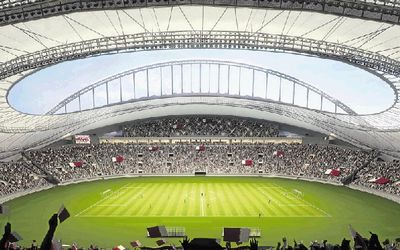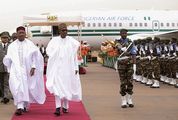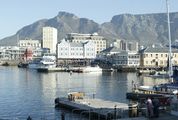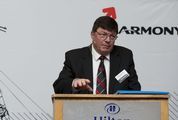Qatar hungry to host more sports events in spite of graft claims
by Agency Staff,
2014-11-27 09:01:00.0
DOHA — Corruption claims and alleged abuse of migrants building facilities for the 2022 World Cup have not dampened Qatar’s appetite to become the "world capital" of prestigious sport events.
Cleared last week by football’s governing body, Fifa, of wrongdoing in gaining the right to host the World Cup, the Gulf emirate last Tuesday won the right to organise the 2019 Athletics World Championships.
The International Association of Athletics Federations (IAAF) announced Doha had beaten Barcelona and Eugene, Oregon, to the dismay of international human rights campaigners.
The Gulf state, which sits on the world’s third-largest gas reserves, has also offered help — ultimately rejected — organising the Africa Cup of Nations in 2015 after Morocco refused to host the tournament over fears of the spread of the deadly Ebola virus.
"Doha will become the world’s capital of sports," Sports Minister Salah bin Ghanem al-Ali said.
The energy-rich country has employed its wealth to lead Arab countries in hosting global sports events.
It is reaping the benefits of a policy launched in the 1990s under which it invested tens of billions of dollars in sports, both at home and overseas. As a sign of the importance of sports, Nasser al-Khelaifi, the president of French champions Paris Saint-Germain, is also a state minister in Qatar.
Qatar also owns the BeIN Sports television channel, which has an increasingly large audience spread beyond the Middle East. The country will organise the world short-course swimming championships next month, the handball World Cup in early 2015 and the world cycling road championships in 2016, Ali noted.
The busy agenda reflects the "confidence of the international sports community in Qatar’s ability to organise international sporting events," he said.
On Monday in Riyadh, Qatar’s 2022 World Cup Organising Committee unveiled a model of the renovated design for Khalifa Stadium with a seating capacity of 40,000 and equipped with a cooling system, to overcome the country’s temperatures that exceed 45°C in summer.
Meanwhile, the Al Attiya Arena, built in only 18 months to host the men’s handball world championship between January 15 and February 1, boasts digital maps and high-tech screens to display results. It can be converted into an ice hockey rink within 48 hours.
Qatari officials say it is inevitable that the country’s success has courted controversy. "Despite FIFA’s decision to clear Qatar in corruption suspicions, the bashing will continue," said Hassan al-Thawadi, secretary general of the 2022 World Cup organising committee.
"We will respond by continuing to work and win," he said.
Fifa has not yet closed the file of suspected corruption in the process of obtaining the right to host the football showcase in eight years’ time.
Football’s world governing body lodged a criminal complaint with the Swiss attorney-general over "possible misconduct" by individuals, including "international transfers of assets with connections to Switzerland".
Moreover, a former member of the Qatar-bid team for the World Cup, who testified in the investigation over alleged corruption, said last Wednesday that the US’s Federal Bureau of Investigation had offered her protection following threats to her and her children.
Qatar is also facing repeated criticism by human rights organisations over the conditions of the mostly Asian migrant workers building the infrastructure.
Amnesty International and Human Rights Watch last week condemned the IAAF’s decision to grant Qatar the right to hold the 2019 athletics tournament.
Authorities in Qatar have been also criticised for being slow in introducing promised reforms to their labour rules, including the Kafala sponsorship law, which subjects foreign workers to the mercy of their employers.
Earlier this month, the labour ministry said it would introduce new legislation by early 2015 to improve migrant conditions. Qatar has 1.6-million foreign workers of a total population of 2.2-million people.
Qatar’s interest in sports goes beyond organising events to sponsoring football clubs such as Barcelona.
Its sponsorship of the prestigious $5m Prix de l’Arc de Triomphe has made it the world’s second richest horse race after the Dubai World Cup.
AFP

A handout computer-generated image in a handout shows the Khalifa International Stadium in Doha after its renovation, ahead of the 2022 World Cup. Picture: AFP PHOTO
DOHA — Corruption claims and alleged abuse of migrants building facilities for the 2022 World Cup have not dampened Qatar’s appetite to become the "world capital" of prestigious sport events.
Cleared last week by football’s governing body, Fifa, of wrongdoing in gaining the right to host the World Cup, the Gulf emirate last Tuesday won the right to organise the 2019 Athletics World Championships.
The International Association of Athletics Federations (IAAF) announced Doha had beaten Barcelona and Eugene, Oregon, to the dismay of international human rights campaigners.
The Gulf state, which sits on the world’s third-largest gas reserves, has also offered help — ultimately rejected — organising the Africa Cup of Nations in 2015 after Morocco refused to host the tournament over fears of the spread of the deadly Ebola virus.
"Doha will become the world’s capital of sports," Sports Minister Salah bin Ghanem al-Ali said.
The energy-rich country has employed its wealth to lead Arab countries in hosting global sports events.
It is reaping the benefits of a policy launched in the 1990s under which it invested tens of billions of dollars in sports, both at home and overseas. As a sign of the importance of sports, Nasser al-Khelaifi, the president of French champions Paris Saint-Germain, is also a state minister in Qatar.
Qatar also owns the BeIN Sports television channel, which has an increasingly large audience spread beyond the Middle East. The country will organise the world short-course swimming championships next month, the handball World Cup in early 2015 and the world cycling road championships in 2016, Ali noted.
The busy agenda reflects the "confidence of the international sports community in Qatar’s ability to organise international sporting events," he said.
On Monday in Riyadh, Qatar’s 2022 World Cup Organising Committee unveiled a model of the renovated design for Khalifa Stadium with a seating capacity of 40,000 and equipped with a cooling system, to overcome the country’s temperatures that exceed 45°C in summer.
Meanwhile, the Al Attiya Arena, built in only 18 months to host the men’s handball world championship between January 15 and February 1, boasts digital maps and high-tech screens to display results. It can be converted into an ice hockey rink within 48 hours.
Qatari officials say it is inevitable that the country’s success has courted controversy. "Despite FIFA’s decision to clear Qatar in corruption suspicions, the bashing will continue," said Hassan al-Thawadi, secretary general of the 2022 World Cup organising committee.
"We will respond by continuing to work and win," he said.
Fifa has not yet closed the file of suspected corruption in the process of obtaining the right to host the football showcase in eight years’ time.
Football’s world governing body lodged a criminal complaint with the Swiss attorney-general over "possible misconduct" by individuals, including "international transfers of assets with connections to Switzerland".
Moreover, a former member of the Qatar-bid team for the World Cup, who testified in the investigation over alleged corruption, said last Wednesday that the US’s Federal Bureau of Investigation had offered her protection following threats to her and her children.
Qatar is also facing repeated criticism by human rights organisations over the conditions of the mostly Asian migrant workers building the infrastructure.
Amnesty International and Human Rights Watch last week condemned the IAAF’s decision to grant Qatar the right to hold the 2019 athletics tournament.
Authorities in Qatar have been also criticised for being slow in introducing promised reforms to their labour rules, including the Kafala sponsorship law, which subjects foreign workers to the mercy of their employers.
Earlier this month, the labour ministry said it would introduce new legislation by early 2015 to improve migrant conditions. Qatar has 1.6-million foreign workers of a total population of 2.2-million people.
Qatar’s interest in sports goes beyond organising events to sponsoring football clubs such as Barcelona.
Its sponsorship of the prestigious $5m Prix de l’Arc de Triomphe has made it the world’s second richest horse race after the Dubai World Cup.
AFP





















Post a comment